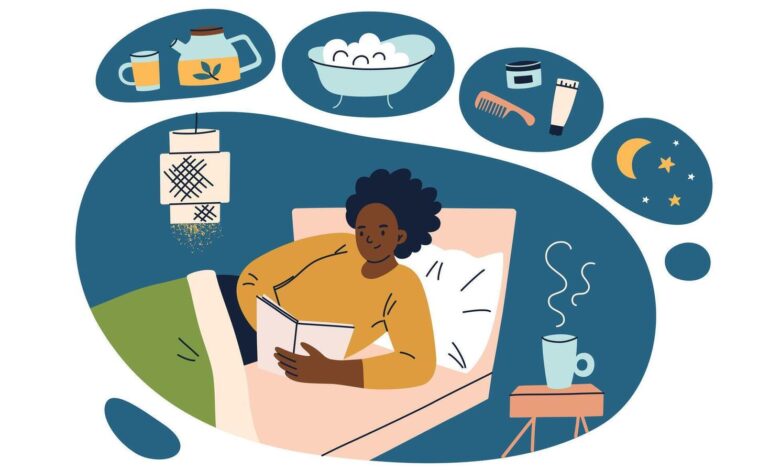Evening Rituals for Better Sleep

Evening Rituals: Your Pathway to Deeper Sleep
We all know that a good night’s sleep is essential – it impacts everything from our mood and energy levels to our overall health and cognitive function. But in today’s fast-paced world, achieving truly restful sleep can feel like an elusive goal. Often, we find ourselves tossing and turning, staring at the ceiling, unable to switch off. The good news? You don’t need expensive gadgets or complicated routines; a well-crafted evening ritual can be your secret weapon for unlocking deeper, more restorative sleep.
The Science of Sleep: Why Evening Rituals Matter
Before we dive into specific activities, let’s understand why evening rituals are so effective. Our bodies operate on a natural internal clock called the circadian rhythm – a roughly 24-hour cycle that regulates various functions, including sleep-wake cycles. This rhythm is heavily influenced by light exposure and hormone levels.
As evening approaches, our brains begin to produce melatonin, a hormone that promotes drowsiness and prepares the body for sleep. Exposure to blue light emitted from screens (phones, tablets, computers) suppresses melatonin production, essentially telling your brain it’s still daytime. Furthermore, engaging in stimulating activities close to bedtime – intense workouts or stressful conversations – can also interfere with this natural process.
Evening rituals work by gently nudging the body toward sleep mode, reinforcing the circadian rhythm and maximizing melatonin production. By consistently performing relaxing activities at a similar time each night, you’re sending clear signals to your brain that it’s time to wind down.
Building Your Personalized Evening Ritual
There’s no one-size-fits-all approach to evening rituals; the best routine is one that suits *your* preferences and lifestyle. However, here are several effective activities you can incorporate, along with the science behind their benefits:

1. The Warm Bath or Shower: A Relaxation Reset
Taking a warm (but not scalding!) bath or shower about 90 minutes before bed is a sleep-promoting powerhouse. Here’s why it works: The warm water initially raises your body temperature. As you step out of the bath, your body temperature begins to cool down. This drop in temperature mimics what happens naturally as you prepare for sleep and signals to your brain that it’s time to wind down.
Tip: Adding Epsom salts (which contain magnesium) can further enhance relaxation. Magnesium is known to play a role in muscle relaxation and may help improve sleep quality. Consider adding a few drops of lavender essential oil for its calming aroma.
2. Disconnecting from Screens: The Blue Light Detox
As mentioned earlier, blue light significantly interferes with melatonin production. This is arguably the most crucial element of any evening routine. Aim to disconnect from all screens – phones, tablets, computers, and television – at least 1-2 hours before bedtime.
Tip: If you absolutely *must* use a screen in the evening, consider using blue light filters on your devices or wearing blue light blocking glasses. However, minimizing screen time remains the most effective strategy.
3. Reading a Physical Book: Engaging Your Mind Without Stimulation
Reading a physical book (not an e-reader!) is a fantastic way to wind down and quiet your mind. The act of reading engages your brain without being overly stimulating, unlike scrolling through social media or watching fast-paced videos.
Tip: Choose something light and enjoyable – avoid thrillers or anything too suspenseful that might keep you on edge. A good novel or a collection of short stories are excellent choices.
4. Gentle Stretching & Relaxation Techniques
Gentle stretching, yoga, or progressive muscle relaxation can help release tension and prepare your body for sleep. Tight muscles can contribute to restless nights. Simple stretches targeting the neck, shoulders, and back can make a significant difference.
Tip: Look up guided meditation or progressive muscle relaxation videos online (but do so *before* starting your ritual – don’t get sucked into a YouTube vortex!). Focus on slow, deep breaths throughout these practices. The goal is to release physical and mental tension.
5. Herbal Teas & Calming Beverages
Certain herbal teas, like chamomile or valerian root tea, are known for their calming properties. These teas contain compounds that may help promote relaxation and reduce anxiety.
Tip: Avoid caffeinated beverages (coffee, black tea, green tea) at least 6 hours before bedtime. Even decaffeinated coffee can contain small amounts of caffeine.
6. Journaling: Clearing Your Mind
Writing down your thoughts and feelings before bed can help clear your mind and prevent racing thoughts from keeping you awake. This is particularly helpful if anxiety or worries are contributing to your sleep problems.
Tip: Don’t dwell on negativity; focus on gratitude lists, positive affirmations, or simply documenting the day’s events without judgment.
Consistency is Key
The most important aspect of establishing an effective evening ritual is consistency. Aim to perform your chosen activities at roughly the same time each night, even on weekends. This reinforces your circadian rhythm and helps train your body to recognize that it’s time to wind down.
Start small: Don’t try to overhaul your entire routine overnight. Begin by incorporating one or two new habits and gradually build from there.
Troubleshooting Your Routine
If you’ve implemented an evening ritual but aren’t seeing results, consider these factors:
- Timing: Experiment with different activity timings to see what works best for you.
- Environment: Ensure your bedroom is dark, quiet, and cool (around 65 degrees Fahrenheit).
- Consistency: Are you *really* sticking to the routine every night? Even occasional deviations can impact effectiveness.
- Underlying Issues: If sleep problems persist despite a consistent evening ritual, consult with a healthcare professional to rule out any underlying medical conditions or sleep disorders.
By prioritizing your evenings and creating a relaxing routine, you’re investing in not only better sleep but also improved overall health and well-being. Sweet dreams!



